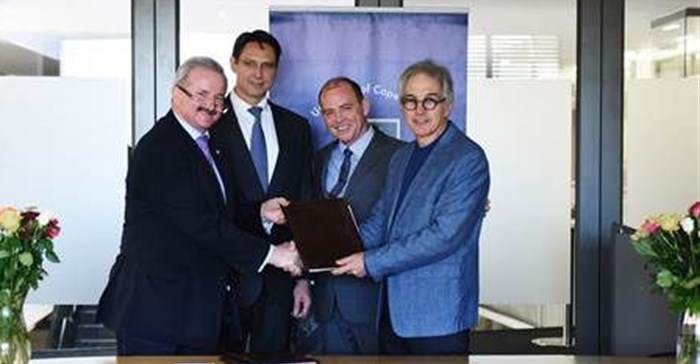The University of Cape Town (UCT) and the Fraunhofer Institute for Solar Energy Systems ISE have signed a memorandum of understanding (MoU) to collaborate on hydrogen and fuel cell technology that will accelerate progress in these fields.

President of the Fraunhofer Gesellschaft, Professor Reimund Neugebauer, Dr Christopher Helbing, director: Division of Hydrogen Technologies, Fraunhofer ISE, Professor Jack Fletcher, Department of Chemical Engineering and UCT Vice-Chancellor, Dr Max Price.
Using electricity from renewable energy sources such as wind and solar, hydrogen can be produced by water electrolysis, and used as fuel in diverse applications including zero-emissions fuel cell cars and buses. Hydrogen is also an excellent feedstock for catalytic conversion with carbon dioxide to produce liquid synthetic fuels that replace diesel or gasoline (gas-to-liquids).
Fraunhofer ISE's work in hydrogen technologies comprises fundamental research on the production, conversion, and catalytic processing of hydrogen, as well as models to investigate the role of hydrogen in the future energy system.
Knowledge-based economy
The Catalysis Institute in the Department of Chemical Engineering at UCT hosts HySA/Catalysis, one of the three centres of competence that form part of the South African Department of Science and Technology’s national hydrogen and fuel cells technologies flagship project, Hydrogen South Africa (HySA).
The centre’s overall aim is to transform South Africa from a resource-based economy to a knowledge-based economy and in doing so, add high value to the country’s mineral wealth.
Having developed a good working relationship over the years, the UCT Department of Chemical Engineering and Dr Christopher Helbing, who is the director in the Division of Hydrogen Technologies at Fraunhofer ISE, decided to formalise the collaboration at a ceremony where an MoU centred around hydrogen technologies was signed in the presence of the President of the Fraunhofer Gesellschaft, Professor Reimund Neugebauer.



































